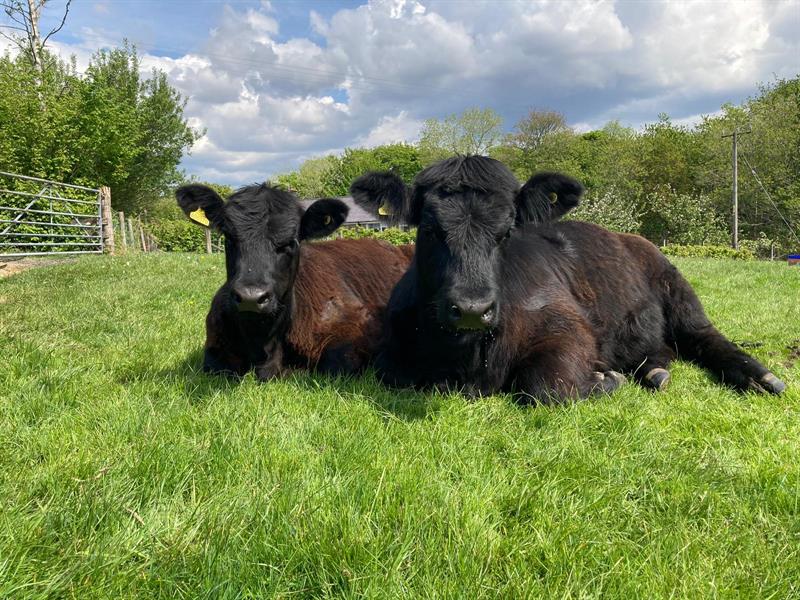Due to the drop in temperature and reduced midge activity, the UK's Chief Veterinary Officer has confirmed the UK is in the seasonally vector low period for bluetongue virus. This came into effect from 12 noon on 21 January.
Defra has confirmed that the Restricted Zone (RZ) currently in place across affected regions along the east and south coast of England will remain in place. There are however temporary changes to movement restrictions for those farmers in Wales who may have livestock in the restricted zone in England.
What does this mean for Wales?
From Wednesday 26 March 2025 non-breeding cattle, goats, sheep, and camelids over the age of 60 days will be able to move out from the Restricted Zone (RZ) without a pre-movement test. A specific movement licence for each animal will still be required. However, only the following animals will still require both a pre-movement test and a specific movement licence to move out of the RZ:
- Entire males intended for use in breeding
- Pregnant females (or pregnancy status unknown)
- youngstock that are aged 60 days or younger at the time of the movement, unless they are travelling at foot with the maternal dam - in this case, you can test the maternal dam by PCR and ELISA.
This is a temporary change that will apply until Thursday 12 June 2025, although the end date could be shorter depending on evidence that the risk of bluetongue virus transmission has increased.
There is free pre-movement testing currently available to move animals from England and more information about how to apply can be found on the Government website.
You should register using the CPH of the holding the animals are on tack at in England.
From 27 May 2025, the length of time that pre-movement test samples are valid changed from 21 days to 10 days. Samples taken until 11:59pm on 26 May 2025 are valid for 21 days and samples taken on or after 27 May 2025 are valid for 10 days.
APHA will email the results to you or your private vet. Negative results from samples taken by UK Farmcare or the private vet and submitted for free testing will be reported to APHA. When APHA receives your negative results, they can issue you a licence. You should allow at least 5 working days after the laboratory receives your samples.
If an animal tests positive at the pre-movement test, its movement will be restricted. If an animal tests positive then it is only the positive animal that is restricted, not the whole bunch.
‘Window of opportunity but vigilance is key’
NFU Cymru Deputy President Abi Reader said: “Confirmation that we are now in the seasonally vector low period for bluetongue virus (BTV) is to be welcomed.
“For Welsh farmers wanting to move stock from within the RZ in England into Wales, especially those with sheep away on tack, there is a window of opportunity for this now to happen, subject to pre-movement testing.
“While we are in the low vector period, vigilance and good biosecurity remain key. If you suspect a case of Bluetongue, you must report it immediately to APHA.”
Read the full update at: GOV.UK | Seasonally vector low period for bluetongue begins.
Ongoing policy work
NFU Cymru is working with Welsh Government on its control strategy for BTV. It is highly likely that we will see overwintering and there may be a resurgence of the virus in the UK this spring as the temperatures rise again. This means we must be prepared as, although there is modelling taking place, we cannot be exactly sure where or when the virus will resurface. The CVO for Wales recently spoke at NFU Cymru Council and members of Council had the opportunity to question him about the approach Welsh Government may take towards BTV-3 in 2025.
Welsh Government confirmed that it has licenced the three BTV-3 vaccines for use in Wales. You can read more about this here.
BTV update - 4 February: abortions and deformities in calves
Over the last few weeks, APHA have started receiving reports of aborted calves or newborn calves, mostly in the high-risk areas of England, showing weakness, ill thrift and / or brain deformities – these later died or were euthanised. Upon veterinary inspection (postmortems or serological tests), these calves have been confirmed as BTV3 positive.
NFU Cymru is also hearing from EU Countries that they are seeing similar issues with calves.
Bluetongue is a notifiable disease – this means that any animal keeper who suspects BTV in their animals must report that suspicion which includes any abortions or deformed calves.
These clinical impacts on new borne or aborted calves is an indication of infection in the dam during early second trimester of pregnancy (so these early cases indicate infection during Sept-Oct 2024). We don’t know yet what the next few weeks of spring calving and lambing will ‘look like’ for animal keepers, but this development in the clinical picture is concerning.
Abortions and/ or brain deformities can also indicate the previous presence of other diseases, such as the non-notifiable Schallenberg Virus (SBV). It is important to note that cattle keepers have a legal duty to report abortions under legislation associated with Brucellosis.
NFU Cymru urges all cattle keepers to report any abortions or premature, deformed, ill-thrifting calves to the Animal and Plant Health Agency on 0300 303 8268.
